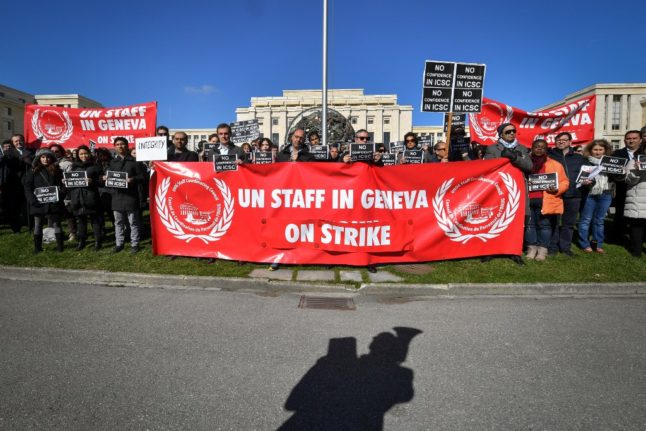Why does Switzerland see very few strikes compared to France or Germany?

History shows that Switzerland’s workers don’t go out on strike as often as their neighbours. Why does the country have a long tradition of avoiding industrial conflicts?
France is well known for its strike culture and Germany also sees plenty of strikes, including on the transport system recently. The Swiss - as always - have been watching how events in the two neighbouring countries unfold.
But this is not to say that Switzerland’s workers are totally ‘disinterested’ in following in the the steps of their European counterparts. In fact, in October 2022, Geneva’s public transport employees walked out for a day and a half until their demands for higher wages had been granted.
That strike was local and short-lived — unlike the far-reaching and long-lasting actions in France and Germany — but at about the same time, pilots at the country’s national airline, SWISS, threatened to stop flying unless the company improved their salaries and working conditions.
That strike was averted after an agreement was reached between SWISS and the pilots’ union, avoiding a massive action that would have paralysed air traffic in Switzerland and elsewhere, and undoubtedly would have repercussions on travel industry and the country’s economy as well.
Looking back, Switzerland has not experienced major strikes since the late 19th and early 20th centuries, “when Swiss workers used to strike as often as their colleagues in other European countries", Christian Koller, a historian and director of the Swiss Social Archive, told The Local.
One such event happened in November 1918, when the country was immobilised by a three-day general strike involving 250,000 people. It was the culmination of violent social conflict that had spread in Europe near the end of World War I. Three strikers were killed by the Swiss army.
Striking was relatively common in the inter-war years as well, but then virtually disappeared after 1945.
The reason for this turnaround, according to Koller, was that “the number of collective employment agreements had massively increased during the last big strike wave of the late 1940s. Many of these contracts excluded strikes."
Also, “long-standing economic growth from the late 1940s to the early 1970s made it possible for employers and trade unions to agree on successive improvements for workers, such as pay rises, reduction of working hours, and paid holidays.”
“Basically, Switzerland has known very low strike rates since the early 1950s,” he added.
To this day, these collective labour agreements (CLAs) are the reason why strikes are not as prevalent in Switzerland as they are elsewhere (read more about it below).

With a CLA, Swiss employees prefer to work than strike. Photo by Arlington Research on Unsplash
‘Revival’ of strikes
While they became much less common after the introduction of CLAs, certain geo-political events in the second half on the 20th century — such as the oil crisis in the mid-1970s and economic downturn of the 1990s — prompted a “certain revival of striking in Switzerland."
On one hand, some employers started to consider collective agreements “as an outdated model and took a more conflictive stance," Koller noted. "On the other hand, a new generation of trade union leaders didn’t consider strikes as a taboo any longer and made efforts to organise them again.”
However, even then, “the rates didn’t increase significantly."
The more recent strikes, including the repeated walkouts of construction workers that have happened sporadically in the last two decades — are part of this development.
However, as Koller pointed out, strikes in Switzerland are “nevertheless unlikely to become an everyday phenomenon like in France in the foreseeable future".

United Nations employees hold a banner a the UN offices in Geneva during a strike day to protest against wage cuts, on March 23, 2018. Photo by Fabrice COFFRINI / AFP
The role of CLAs
These collective labour agreements play a huge role in a relatively low strike rate in Switzerland.
They are contracts negotiated between Switzerland’s trade unions and employers or employer organisations. Generally speaking, they cover a minimum wage for each type of work; regulations relating to work hours; payment of wages in the event of illness or maternity; vacation and days off; and protection against dismissal.
Other important employment-related matters are also subject to negotiations — for instance, pension fund regulations, early retirement, conflict resolution procedures, and funding of training.
CLAs are sector-specific; in other words, they take into account the particular aspects of each branch. As an example, Switzerland’s largest labour union, The Swiss Federation of Trade Unions (UNIA), maintains 265 collective agreements in the areas of industry and construction.
Collective agreements can also be company-specific — for instance, Coop, Migros, or SWISS airline — or specific to a certain region.
READ ALSO : What is a Swiss collective bargaining agreement — and how could it benefit you?
Even though other countries - such as Germany - also have this system, it seems that Swiss firms generally avoid industrial action taking place through the negotiation process, or perhaps the Swiss are more conflict avoidant in nature.
“It is in our genes to solve problems by talking to each other rather than more antagonistic means,” Hansjörg Schmid, a spokesperson for the Swiss Employees Association told Swiss media.
“This tradition is anchored in our society and can also be seen in Swiss democracy. People can voice their opinions and change things through referendums, which also reduces conflict."
Comments
See Also
France is well known for its strike culture and Germany also sees plenty of strikes, including on the transport system recently. The Swiss - as always - have been watching how events in the two neighbouring countries unfold.
But this is not to say that Switzerland’s workers are totally ‘disinterested’ in following in the the steps of their European counterparts. In fact, in October 2022, Geneva’s public transport employees walked out for a day and a half until their demands for higher wages had been granted.
That strike was local and short-lived — unlike the far-reaching and long-lasting actions in France and Germany — but at about the same time, pilots at the country’s national airline, SWISS, threatened to stop flying unless the company improved their salaries and working conditions.
That strike was averted after an agreement was reached between SWISS and the pilots’ union, avoiding a massive action that would have paralysed air traffic in Switzerland and elsewhere, and undoubtedly would have repercussions on travel industry and the country’s economy as well.
Looking back, Switzerland has not experienced major strikes since the late 19th and early 20th centuries, “when Swiss workers used to strike as often as their colleagues in other European countries", Christian Koller, a historian and director of the Swiss Social Archive, told The Local.
One such event happened in November 1918, when the country was immobilised by a three-day general strike involving 250,000 people. It was the culmination of violent social conflict that had spread in Europe near the end of World War I. Three strikers were killed by the Swiss army.
Striking was relatively common in the inter-war years as well, but then virtually disappeared after 1945.
The reason for this turnaround, according to Koller, was that “the number of collective employment agreements had massively increased during the last big strike wave of the late 1940s. Many of these contracts excluded strikes."
Also, “long-standing economic growth from the late 1940s to the early 1970s made it possible for employers and trade unions to agree on successive improvements for workers, such as pay rises, reduction of working hours, and paid holidays.”
“Basically, Switzerland has known very low strike rates since the early 1950s,” he added.
To this day, these collective labour agreements (CLAs) are the reason why strikes are not as prevalent in Switzerland as they are elsewhere (read more about it below).

‘Revival’ of strikes
While they became much less common after the introduction of CLAs, certain geo-political events in the second half on the 20th century — such as the oil crisis in the mid-1970s and economic downturn of the 1990s — prompted a “certain revival of striking in Switzerland."
On one hand, some employers started to consider collective agreements “as an outdated model and took a more conflictive stance," Koller noted. "On the other hand, a new generation of trade union leaders didn’t consider strikes as a taboo any longer and made efforts to organise them again.”
However, even then, “the rates didn’t increase significantly."
The more recent strikes, including the repeated walkouts of construction workers that have happened sporadically in the last two decades — are part of this development.
However, as Koller pointed out, strikes in Switzerland are “nevertheless unlikely to become an everyday phenomenon like in France in the foreseeable future".

The role of CLAs
These collective labour agreements play a huge role in a relatively low strike rate in Switzerland.
They are contracts negotiated between Switzerland’s trade unions and employers or employer organisations. Generally speaking, they cover a minimum wage for each type of work; regulations relating to work hours; payment of wages in the event of illness or maternity; vacation and days off; and protection against dismissal.
Other important employment-related matters are also subject to negotiations — for instance, pension fund regulations, early retirement, conflict resolution procedures, and funding of training.
CLAs are sector-specific; in other words, they take into account the particular aspects of each branch. As an example, Switzerland’s largest labour union, The Swiss Federation of Trade Unions (UNIA), maintains 265 collective agreements in the areas of industry and construction.
Collective agreements can also be company-specific — for instance, Coop, Migros, or SWISS airline — or specific to a certain region.
READ ALSO : What is a Swiss collective bargaining agreement — and how could it benefit you?
Even though other countries - such as Germany - also have this system, it seems that Swiss firms generally avoid industrial action taking place through the negotiation process, or perhaps the Swiss are more conflict avoidant in nature.
“It is in our genes to solve problems by talking to each other rather than more antagonistic means,” Hansjörg Schmid, a spokesperson for the Swiss Employees Association told Swiss media.
“This tradition is anchored in our society and can also be seen in Swiss democracy. People can voice their opinions and change things through referendums, which also reduces conflict."
Join the conversation in our comments section below. Share your own views and experience and if you have a question or suggestion for our journalists then email us at [email protected].
Please keep comments civil, constructive and on topic – and make sure to read our terms of use before getting involved.
Please log in here to leave a comment.